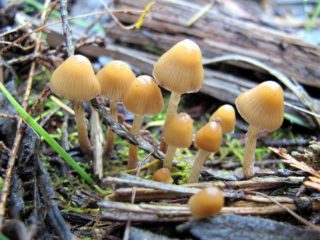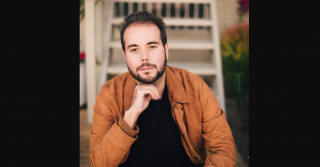The future of psychedelics for medical and therapeutic use is looking positive. New Jersey is the latest state to relax legal implications for the possession of psilocybin. The therapeutic plant is following closely in cannabis’s footsteps, as society explores the medicinal benefits of mushrooms. Psilocybin has now been decriminalized in states such as Michigan, Denver, Washington D.C., and now New Jersey. It is also officially legal in Oregon for supervised mental health treatment. As this substance becomes more accessible, further questions arise regarding psychedelics and their future in society. We spoke to Matt Stang, founder, and CEO of Delic, about the future of psychedelics.
WATCH THE VIDEO
You can watch the full interview below.
About Matt Stang
Stang has spent over 20 years in the cannabis space; he was previously the owner and operator of one of the 1st cannabis-centered media and events companies called High Times and has helped build many other massive cannabis brands through his platform. After selling High Times, Stang, alongside his wife, Jackee, came up with Delic, the first-ever psychedelic wellness corporation. They believe psychedelics are at a tipping point, similar to that of cannabis nearly 8 years ago.
“Having lived through one, we saw this one coming…”
Stangs created Delic as a platform for mainstream psychedelic wellness. But what exactly does this mean?
What are psychedelics?
They are a group of substances that alter the user’s mental state. This includes the user’s cognitive abilities, senses, mood. In short, psychedelics cause the user to experience a “trip”. These substances can be made in a lab, or they can occur naturally, like psilocybin, also known as “magic mushrooms”.
Psilocybin Mushrooms
Stang explains that psychedelics are therapies that allow an individual with mental issues and disorders, such as anxiety, depression, PTSD, Borderline Personality Disorder, and even addiction. Many of these conditions are typically unsolvable in the long term under the current regime of Western medicine. Psychedelics offer an alternative pathway to getting better. He explained how he witnessed this firsthand to his wife, who was able to combat her anxiety disorder through psychedelics.
“Psychedelic medicine gave her the ability to get through her trauma and her anxiety,”

Psilocybin
Cannabis and psychedelics
As parallels are drawn between cannabis and psilocybin, the question regarding the accessibility of such psychedelics arises. A small patch of earth and cannabis can be at one’s green fingertips; can psilocybin follow suit? Or does it require further manufacturing or medical input?
According to Stang, you can never fully outlaw the use of a plant that can easily grow in ones’ backyard. He learned this from years of pioneering awareness around cannabis and lobbying for its legalization. However, he admits that it is a bit more complicated with psychedelics. Some are compounds derived from plants or mushrooms such as psilocybin and others can only be manufactured in a laboratory.
Psychedelics are a Schedule 1 substance
From 1950 to 1965, these novel compounds were studied extensively. Researchers tracked their benefits to the educational and psychiatric world. He went on to mention Bill Wilson, creator of Alcoholics Anonymous, originally intended for LSD to be a part of the 12-step program to curb addiction. This is because he had studied the therapeutic properties that psychedelics held.
Of course, this never materialized. LSD was banned following the popularity of recreational use of the drug in the 60s. Abuse of the substance, as well as a lack of understanding of its side effects and dangers, led to psychotic reactions. This resulted in mental breakdowns, crime, accidents, and suicide. It was then prohibited by the UN in late the 70s, as it was classified as a Schedule 1 Substance in which the “potential for abuse outweighs their medicinal potential”. However, interest in the medicinal and therapeutic properties of psychedelics sparked back up in the late 90s, causing a wave of research on the substances’ therapeutic potential, and research on them has continued to grow.
What Do We Do With Them?
How do we, as a society, approach these compounds in current times, and what do we do with them?
Clearly, some psychedelics like psilocybin can be grown at home and used without too much difficulty. The barriers to use are lower than other psychedelics that have to (and should be) manufactured in a laboratory under scientific supervision.
So the future development of psychedelics will be driven by what is considered safe and legal use.
Stang’s company, Delic, bought a company called Easy Grow Mushroom Kit, the original 1976 mushroom-growing kit, in order to make these mushrooms more accessible to people living in states where possession has been legalized. However, a structure is yet to be developed in terms of the individual being able to purchase these substances.
In November 2020, Oregon became the first state to legalize psilocybin for supervised use in treating incurable mental health problems. The therapies will begin legally with approval in January 2023.
What this means says Stang, “You’ll be able to go to a clinic… and you could have a therapist, but you could also have another medical professional. They’ve kind of left it open. They’ve given space for therapeutic use. And so, they’ll have licensed production and manufacturing of psilocybin products, as well as a licensed therapeutic space for people to come in and have a supervised journey with psilocybin.”
Regular Therapy vs. Psychedelic Therapy
Stang goes on to explain the statistics comparing regular and psychedelic-based therapy, and the clinical improvement experienced by veterans after one year, which comes out to a staggering 4-5% improvement rate for traditional therapy, versus 60-70% for psychedelic-based therapy.
He also said his company has bought a chain of clinics that utilize Ketamine, which is currently the only psychedelic fully legal under FDA compliance, as a therapeutic substance. He strongly believes that psilocybin will be systemically available nationwide in America in the next few years so that people will have safe and effective access to those substances, should they need them.
A Market for Mushrooms
In the meantime, though, Stang and his team have moved in on Canada’s steadily loosening psilocybin regulations in order to further their own research.
Canada and controlled substances
As a matter of record, to legally possess and conduct activities with controlled substances in Canada, companies and research organizations must first obtain a controlled Substance Dealer’s License. This is also a Section 56 exemption for researchers (physicians, veterinarians, and other researchers affiliated with universities and private industry) who require a controlled substance for research purposes. This includes in vitro utilization, administration of animals and/or human clinical trials).
This license authorizes the company or the organization to possess controlled substances and to conduct activities specified by the license. This pertains to production, packaging, sale, sending, transportation, delivery, laboratory analysis, research & development, clinical studies, import/export, or distribution under special access program only.
Controlled substances can only be imported or exported if the shipment is authorized by a permit issued by Health Canada. Only a holder of a valid controlled substance Dealer’s License is eligible to apply for an import/export permit. Health Canada’s proposed intent is to review the Special Access Programme (SAP) and related regulations to permit certain authorized uses of psilocybin-assisted psychotherapeutic treatments. The intended SAP revision announced on December 11th, could lead to important new medical applications, particularly in the complex and growing mental health sector.
A Canadian base
Delic has purchased a lab in Canada that has a Psilocybin license from Health Canada, and currently have a team of PhDs there furthering their knowledge on the compound, while also working on developing novel psilocybin products and potential delivery methods to approach the Oregon market, as well as other future states that will take a cannabis-like approach to the notion of psilocybin-therapy outside of the FDA-regulatory structure:
“We’re working on a psilocybin-vaporizer that would allow people to have a quick, doseable experience, utilizing psilocybin in a therapeutic space, in a clinical space, but outside of the FDA framework,” Stang explains.
What Can Go Wrong?
It seems by all accounts that psilocybin is following the path that cannabis has paved. However, there are greater risks with mind-altering psychedelics.
The nature in which it alters the brain is more dramatic. With psilocybin, side-effects such as nausea, muscle fatigue, dizziness, and a sense of paranoia can accompany a mushroom experience. An individual can easily experience a bad “trip” if dosages are inappropriate for their emotional and physical state.
Joseph Campbell, American author, professor, and editor stated that the experience of psychedelics can be regarded as a form of forced schizophrenia.
Regardless of the accuracy of this claim, Stang stresses that individuals with a family history of schizophrenia are strongly advised against the use of psychedelics, as it could potentially take the individual across that schism in the brain.
Legally assisted therapy
The individual’s understanding of their own mental state is an integral part of the informed decision-making process that should always accompany the use of psychedelics. This is why authorities are insisting on legal assisted therapy as therapies like psilocybin are being brought out of the shadows.
Stang talks about the importance of a good support structure and safe space when taking a substance such as psilocybin, as well as the integral role the individual’s mindset plays in the experience:
“It’s your own brain healing you. It sounds mystical, it sounds magical, but it’s not. You have to go in with the intention of what you want to do. Because the substance is literally just throwing your own chemicals into your brain in different ways than they normally work, in order to create different neural pathways and brain spaces. If you go into it thinking about death and destruction, it’s not going to be pretty, it’s not going to be a fun time, it’s not going to be healing, it’s going to be destructive and terrifying,” Stang explains.

Matt Stang
He stresses the importance of knowing and understanding the potential dangers of these substances. This will allow the user to make an informed decision based on the potential positive and negative outcomes.
The National Institute of Drug Abuse states that the use of psychedelics could cause short-term nausea, dizziness, excessive sweating, increased blood pressure and breathing rate, and feelings of paranoia. Some of the more extreme side effects can include psychosis and syndromes that mirror schizophrenia.
“Informed consent is important.”
However, Stang emphasizes that the existence of such dangers or negative outcomes does not mean that the substance should be banned. Education and information are required, so adults considering this therapy understand all the risks associated with it, but also the benefits.
“Should we ban sugar? Or salt? I’ve seen a lot of people die of heart attacks and hypertension. I think the greatest, quickest pathway to an altered brain is a donut in the morning. Or how about coffee? To me, it’s that we’ve been hypocritical in that which we encourage and that which we ban.”
He elaborates on the subject, saying that while these substances are potent and powerful, they are also non-toxic and non-lethal. The potential dangers that they pose should be disclosed in a manner similar to that of caffeine, sodium, and sugar. Stang’s aforementioned words are the key: informed consent.
The Dangers of Driving It Underground
Stang says the criminalization of these psychedelics is adding to the risk of potential users, particularly with substances that require lab input:
“You’re forcing people to make drugs outside of a clinical lab setting. And so, they do it poorly. They have a profit motive, and they don’t have any oversight. This is a rational reason to come up with a regulatory framework that allows for people to have these substances to improve their health, without the risk of a detrimental effect due to a bad compound, or someone not properly breaking the molecule. That can be dangerous, or even deadly, without being about the substance itself,” Stang explains.
In other words, Stang believes banning the substance is not going to stop people from using it. Rather, it just increases the odds of unsafe use of the substance. He explains that, by creating a regulated methodology for the production and consumption of psychedelics such as psilocybin, the substance is made safer, as well as creating the opportunity to collect taxes and build jobs. From a governmental perspective, it simply makes sense.
The Future of Psilocybin
As aforementioned, the decriminalization and legalization of psilocybin are steadily gaining traction in the US, and New Jersey has become the latest state to loosen its penalties, much to Stang’s surprise:
”I’m still surprised at New Jersey; I’m shocked because when I was a kid, I grew up in New York, and New Jersey was the harshest! If you went across that bridge, you knew that Jersey State Police were going to arrest you if you have weed on you, and they were going to stick you in jail for a month! There was no friendliness, no joking, and now, suddenly, cannabis was legalized, and two weeks before, mushrooms were legalized!”
What’s Next?
Stang predicts that California will be the next state to feature an initiative on the ballot for a regulatory psychedelic-based framework in 2022. He believes that there are allies in the state governments who have been elected specifically based on their stances regarding their support for the end of the war on drugs.
As the benefits of psilocybin become more widely recognized, the substance becomes more normalized, which is ultimately the goal: the use of this mushroom for its medicinal and therapeutic benefits by people who need it should be as ordinary as a morning coffee after a late night. Some people might prefer decaf, and others a double shot of espresso; as long as the individual is well-informed on the substance, they should be allowed to make their own decisions.
“If we’re going to have a free society, we need to allow people to make their own mistakes, as well as allowing them to make their own life. You’ve got to give them as much information, and then allow them to make those choices with informed consent.”
Will Psilocybin go mainstream?
Stang foresees that the next few years will see psilocybin’s integration into the mainstream in the same manner as cannabis:
“I spent all those years packing through the jungle to make a path for cannabis to be legal, so rather than having to kind of stumble through the Amazon and make your way through the vines, it’s just a nice, even road that people can follow and understand.”
Longevity Live Disclaimer: This article does not endorse the use of any psychedelic for recreational use.
Reference List
Johnson, S. 2020. What will ‘psychedelic therapy’ look like when it’s legalized? [online] Available at: https://bigthink.com/mind-brain/psychedelic-therapy?rebelltitem=4#rebelltitem4
Lebowe, J. 2020. A Global Guide to Where Magic Mushrooms and Psilocybin Are Legal or Decriminalized. [Online] Available at: https://merryjane.com/culture/a-global-guide-to-where-magic-mushrooms-and-psilocybin-are-legal-or-decriminalized
Mammoser, G. 2019. Mushrooms as Medicine? Psychedelics May Be Next Breakthrough Treatment [Online] Available at: https://www.healthline.com/health-news/benefits-of-medical-mushrooms
Walsh, J. 2021. New Jersey Becomes Latest State To Loosen Penalties For Magic Mushrooms. [Online] Available at: https://www.forbes.com/sites/joewalsh/2021/02/04/new-jersey-becomes-latest-state-to-loosen-penalties-for-magic-mushrooms/?sh=331ff8a97072
NIDA. 2021. Hallucinogens. [Online] Available at: https://www.drugabuse.gov/publications/drugfacts/hallucinogens





![women [longevity live]](https://longevitylive.com/wp-content/uploads/2020/01/photo-of-women-walking-down-the-street-1116984-100x100.jpg)









